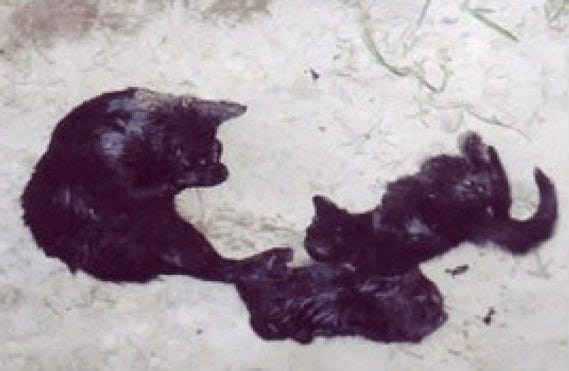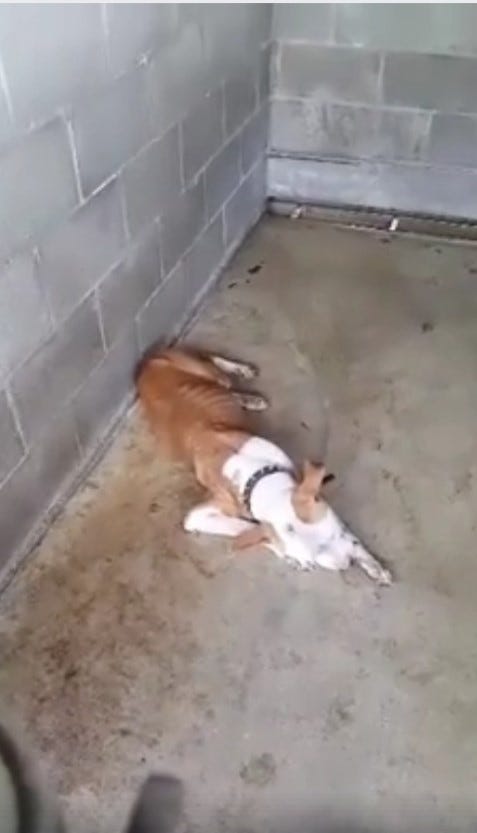In this podcast, we interview Heather Harper-Troje, a former PETA fieldworker. At the behest of PETA founder Ingrid Newkirk, it was her job “to get as many animals as possible” by promising people that they would find homes knowing that “the vast majority of those animals were [to be] killed.” Harper-Troje says killing is not an ancillary part of the job; it goes to the core of the mission. She also describes how a dog named “Black Boy” set her back on the path to animal rights and away from PETA.
The PETA kill room.
The fact that People for the Ethical Treatment of Animals (PETA) has a kill room where it routinely injects thousands of animals a year with fatal doses of barbiturates, including healthy puppies and kittens without ever making them available for adoption, may still come as a surprise to some. Though this killing has been going on now for well over two decades, there are still many people who are unaware and therefore continue to support it through their financial contributions to that organization.
Indeed, killing is not an ancillary part of PETA’s Community Animal Project; it goes to the core of the mission. “The objective of the program,” says Heather Harper-Troje, a former PETA fieldworker, “was to get as many animals as possible and the vast majority of those animals were killed.”
Nothing came between that objective and the staff, including lying to people by telling them that the animals would be adopted: “I was told to pretty much say anything I needed to say to gain custody of an animal… I was told to lie by my direct supervisors directly and then by [PETA founder] Ingrid [Newkirk]…”
The evidence is overwhelming. It not only includes the testimony of Harper-Troje, but another field worker who has since come forward, describing the culture of killing as “terrifying.”
Puppies killed by PETA in the back of a van — a donor funded slaughterhouse on wheels.
It also includes:
The data, self-reported by PETA to the Virginia Department of Agriculture & Consumer Services, showing most animals they seek out are killed.
An inspection report by the Commonwealth of Virginia showing PETA kills 90% of animals within 24 hours without even trying to find them homes.
An OpEd piece written by Ingrid Newkirk which admits that PETA supports a policy that all “pit bulls” should be killed in all shelters in America.
PETA joining a group whose mission it is to kill dogs based on how they look.
The trial of PETA employees after they were found to be rounding up and killing animals in the back of a van despite promising to find them homes.
PETA stealing Maya, a happy and healthy dog, from her home and then illegally killing her.
A judge's ruling calling out PETA's attorney for “unprofessional” and “contemptuous” conduct in the case of Maya; a lawsuit they settled for $49,000 after losing a motion arguing that Maya was worthless.
PETA arguing community cats are better dead than sterilized and fed.
The Virginia Federation of Humane Societies asking the Commonwealth of Virginia to revoke PETA's ability to take in and kill animals.
PETA telling a Mayor to kill all pit bulls, not to foster animals, and not to work with rescue groups.
Ingrid Newkirk admitting that PETA kills healthy, adoptable animals.
Photographs of animals PETA killed.
Intake and disposition records of kittens PETA had killed.
Additional records showing PETA rounds up to kill cats and kittens.
Even more records showing PETA rounds up to kill cats and kittens.
A healthy mother cat and her two equally healthy kittens were given to PETA by a veterinarian who was trying to find them homes and was told by PETA employees that they would have no problem adopting them out. Instead, the PETA employees killed them within minutes in the back of a van.
And not only does PETA kill cats themselves, they demonize community cats in order to get counties to round up and kill them, too. Per PETA, ‘cats smell, they are a nuisance, make too much noise, are a public health and rabies threat, transmit disease and parasites, including “roundworms, hookworms, and even plague,” and “terrorize and kill” 15 billion other animals a year.’ These are hardly the words of an animal-loving rights group.
There’s more. A dog, for example, died following three days of suffering in his kennel, with no medical or supportive care at Sumter County Animal Services in Florida. In response to criticism, county officials maintained that their job was not to save lives, but to provide “euthanasia services” and “culling” of animals. Despite this neglect, PETA sided with the pound, thanking pound staff even though they did not adopt any animals, had no veterinarian onsite to provide medical care, did not allow volunteers to care for animals, and did not allow the public to photograph animals in violation of the First Amendment and Federal law. PETA also thanked pound staff for “standing firmly” against citizens who are working to ensure that neglect is eliminated, lives are saved, adoptioned occur, volunteers are allowed, and constitutional rights are protected.
To learn more and to learn why, read or listen to an audio version of Why PETA Kills.
To learn more about my overwhelming victory against PETA in court, read PETA v. Winograd.
To learn about the neglected dog who set Heather back on the path to animal rights and away from PETA, read Rescued by Black Boy.
Heather’s interview is from August, 2017. It is still very relevant today.


















Inside the PETA Kill Room